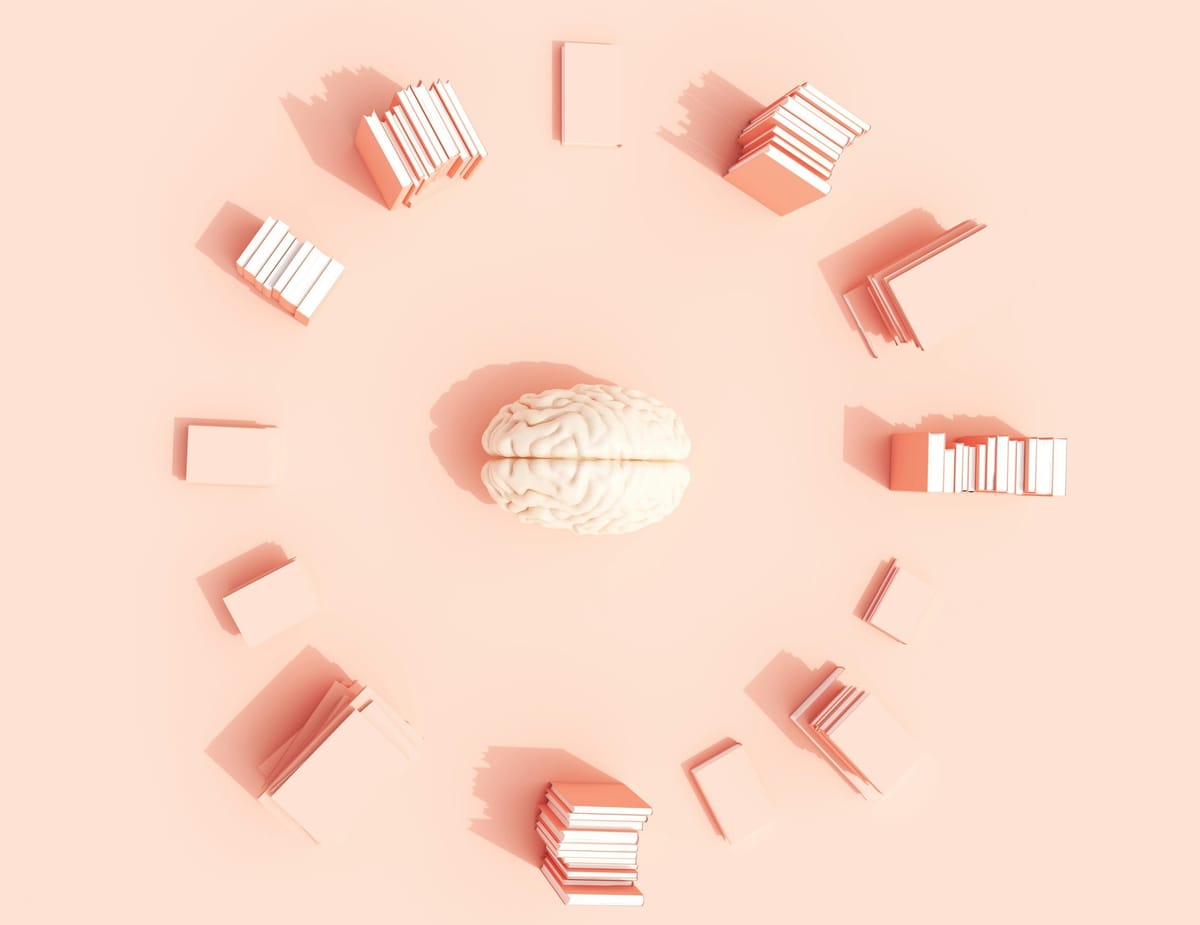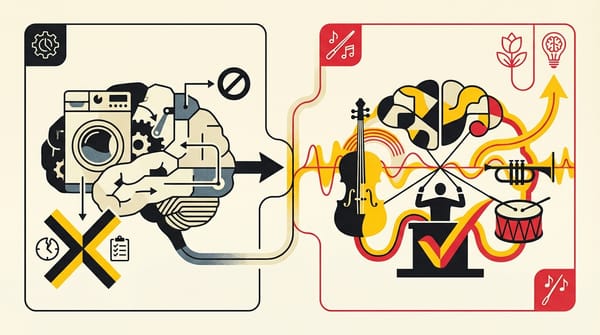Why it is important to know what cognitive abilities are and how they affect our lives
Discover how cognitive abilities shape our daily lives and learn effective strategies to enhance your memory, attention, and decision-making skills.

Podcast version of this article generated by Google NotebookLM, it may contain errors
Our world is changing and developing so rapidly that the concept of "finishing education" has become obsolete. In today's world, learning never ends. Meta skills help us with this continuous learning process, quickly adapting to changes, and much more—which I'll explore in a separate article.
Without cognitive abilities, our memory, attention, and decision-making processes suffer. Let's explore how and why we should improve cognitive skills and what factors hinder their development.
If you've been making small mistakes lately, often forget conversation details, or take a long time to make decisions, this article is for you.
Frequent sleep deprivation can severely impair memory. You might forget meetings with potential clients or lose important conversation details. While using a notebook, taking meeting notes, and organizing a time management system can help, these don't address the root memory problem.
These issues likely indicate a decline in cognitive abilities—the brain's capacity to perceive and process information. Without intervention, remembering events, analyzing situations, and making decisions will become increasingly difficult over time.
In this article, I'll briefly outline how cognitive abilities impact our lives and what we can do to enhance them.
What Are Cognitive Abilities and Why Do We Need Them?
When discussing cognitive abilities, we typically refer to eight components:
- sensation;
- perception;
- imagination;
- thinking;
- memory;
- representation;
- attention;
- speech.
These components affect the brain in various ways. For instance, attention helps us focus on tasks, memory retrieves experiences and impressions, and imagination enables unconventional thinking and fresh perspectives.
Each component of cognitive abilities is interconnected, necessitating comprehensive development.
Why Should Creators and Product Managers Develop Cognitive Abilities?
In business, well-developed cognitive abilities of leaders and team members help:
- discover non-obvious solutions;
- adapt to new conditions;
- maintain focus;
- build team relationships;
- meet deadlines.
Discovering non-obvious solutions. A well-developed imagination is crucial here. When a product manager views the world from different angles and thinks beyond proposed or personal experiences, it becomes easier to conceive innovative products or solutions.
For example, Zara, part of Inditex, pioneered a unique fast fashion model. While most brands released collections seasons in advance, Zara began producing clothing in response to current trends and consumer demand. This approach allowed them to reduce the design-to-shelf process to just a few weeks, enabling quick responses to fashion changes and expanding their target audience.
Adapting to new conditions. The ability to analyze situations and find new development paths helps businesses survive crises. If leaders and employees succumb to emotions every time, it becomes harder to find solutions that adapt the business to new situations.
Imagine two managers in an unstable market. They face identical conditions but act differently. One takes responsibility for decisions, organizes brainstorming sessions with employees, and actively seeks solutions. The other panics and constantly asks superiors to solve even routine issues. Clearly, the first business will be much more resilient.
Maintaining focus. Attention helps concentrate on a single task for extended periods. This skill is especially valuable in high-stakes situations where mistakes can cost thousands or even millions of euros, such as when finalizing large contracts or choosing product strategies.
Without well-developed concentration, a product manager might struggle to focus on priorities and end up tackling tasks chaotically. For instance, they might respond to the most recent emails without prioritizing tasks. As a result, they may resolve minor issues but fail to address the most critical ones.
Building team relationships. Cognitive abilities are directly linked to emotional intelligence. A product manager who's aware of their own emotions can forge strong connections within the team.
A leader with developed emotional intelligence can cultivate trusting relationships where each team member feels heard and valued. This leads to a more efficient team that can eliminate unnecessary processes, adjust ineffective strategies, and foster a sense of importance in every team member.
The clear advantages of developed cognitive abilities should motivate us to enhance them. However, in practice, there are obstacles to overcome before we can effectively train our brains.
Developing mindfulness and attention. Sometimes, our own brains create obstacles that hinder problem-solving. For instance, an entrepreneur might fear failure, leading them to postpone work on a new project or struggle to formulate goals.
To overcome such obstacles, we need to cultivate mindfulness. You can take short breaks during work to observe your breathing, list surrounding scents and sounds, catch yourself in specific thoughts, or even practice mindful eating. Try eating slowly without your phone, chewing deliberately, and noticing how the food's texture changes. Another useful tool is meditation, where you maintain focus on specific objects mentioned in practice instructions without getting swept up in a whirlwind of thoughts. I've collected the best mindfulness training methods in a separate article. While I'm not a certified psychiatrist, this practice reminds me of techniques used to manage panic attacks. During a panic attack, which often occurs suddenly, psychiatrists advise listing objects around you and describing ongoing actions. This technique is typically very effective.
It's also worth exploring techniques like the butterfly hug. YouTube video.
I'll dedicate a separate post to other helpful techniques.
Remember, mindfulness is an ongoing process without a final destination. It's a practice for its own sake, not for achieving a specific goal. Don't rush or invent sensations that aren't there.
"Training and developing mindfulness is challenging, but that's normal. Every day that includes practice is a step towards a reality where you can make effective decisions with a calm mind and enjoy your work, rather than drowning in anxiety and irritation. It's better to practice briefly but daily than to meditate for an hour once a week: the skill develops through consistent practice."
What Hinders the Development of Cognitive Abilities?
The primary obstacles to developing cognitive abilities are issues with sleep, nutrition, physical activity, and chronic stress.
Problems with sleep, nutrition, and physical activity. If you're sleep-deprived, exercises aimed at developing cognitive abilities won't be effective. In such cases, the primary task is to help your brain meet its basic physical needs.
I've written about these topics in a recent article: Mental overload: How to find balance and inner peace while pursuing your goals
Chronic stress. It's normal to feel stressed by sudden events like an employee's dismissal, a delay in implementing a new feature, or a new developer crashing the server. However, if stress is constant, it's a signal that shouldn't be ignored. It's best to consult a specialist or follow the advice in the article mentioned above.
If you're experiencing sleep and nutrition problems, these will interfere with stress management—address these issues first.
Where to Start in Developing Cognitive Abilities
The most crucial rule for developing cognitive abilities is to focus on specific cognitive skills. Mindfulness and memory applications improve these skills only within the context of the app itself and don't necessarily impact your professional activities. A good starting point is keeping a SMER journal to understand what needs development.
Keeping a STER Journal. In cognitive-behavioral therapy, there's a fundamental technique—the STER journal, which stands for "Situation → Thoughts → Emotions → Reactions":
- Situation — a neutral description of the event;
- Thoughts — inner dialogue that arose in response to the situation;
- Emotions, feelings — description of the feelings the situation evoked;
- Reactions, actions — how the situation affected your body and behavior.
This journal records situations that trigger significant emotional surges or abrupt changes in emotions. It's typically maintained in a table format.
You can divide reactions into behavior and bodily sensations. This approach helps analyze your reactions more accurately and adjust them independently or with professional help.
If you find it challenging to start, begin by simply jotting down your most emotional thoughts on paper or in your phone's notes. As you become more adept at recognizing and correctly identifying emotions, you can progress to filling out the table.
Writing down thoughts is crucial for gaining a new perspective on them. People tend to strongly believe their thoughts, so this technique aims to critically analyze anxious moods to change the situation.
For instance, if you fully trust the thought "I looked silly and no one liked me," you might leave a conference immediately after your presentation. But if you approach it critically, you might stay, make valuable connections, or learn something new.
"You don't need to specifically memorize poems or engage in other memory exercises to develop your cognitive abilities. Essentially, cognitive abilities are the potential we're born with. Our task is to guide ourselves and develop in areas we enjoy to unlock new skills."
How to Develop Cognitive Abilities
Here are some effective ways to enhance cognitive abilities:
- The main rule – develop what you need. If you want to read more attentively, read more and practice concentration. An app for memorizing routes will teach you to remember them, but it won't improve your reading focus.
- Regular mental exercises. This can include reading, solving puzzles (remember point 1: choose puzzles relevant to your work or hobbies), learning new skills, or engaging in arts. Any activity that challenges your brain can help improve cognitive abilities.
- Healthy lifestyle. Exercise, balanced nutrition, and adequate sleep can boost overall brain health and enhance cognitive abilities.
- Meditation. Meditation can train your brain to focus and concentrate, improving attention and memory. Keep in mind that meditation doesn't provide instant results, so discipline is crucial. Start with short sessions and gradually increase their duration.
- Social interactions. Communicating with others can stimulate your brain and improve cognitive abilities. While Dale Carnegie's book on winning friends might seem insincere or manipulative, it offers valuable practices for stimulating social interactions. These can help you feel more confident on stage or in conversations with anyone.
- Speech training. Speaking eloquently and expressing yourself logically and clearly is a skill that can be developed. This practice simultaneously enhances attention, memory, and thinking. Remember writing essays in school? There was a good reason for that.
- Continuous learning. Ongoing education or learning new languages, skills, or knowledge can stimulate your brain and improve cognitive abilities. Again, refer to point 1: learn only what you need. Learning a foreign language without a clear goal is likely to be unproductive.
Key Takeaways
- Cognitive abilities encompass eight components: sensation, perception, imagination, thinking, memory, representation, attention, and speech.
- Developed cognitive abilities benefit business by enabling unconventional problem-solving, adaptability, focused attention, and improved team dynamics.
- To enhance cognitive abilities, it's crucial to address issues related to sleep, nutrition, physical activity, and chronic stress.
- Begin developing cognitive abilities by keeping a SMER journal to analyze situations, thoughts, emotions, and reactions.
- Regular mental exercises, a healthy lifestyle, meditation, social interactions, and continuous learning all contribute to improving cognitive abilities.
As always, I invite you to share your opinion in the comments
With love 😽 🤗 😘
K




